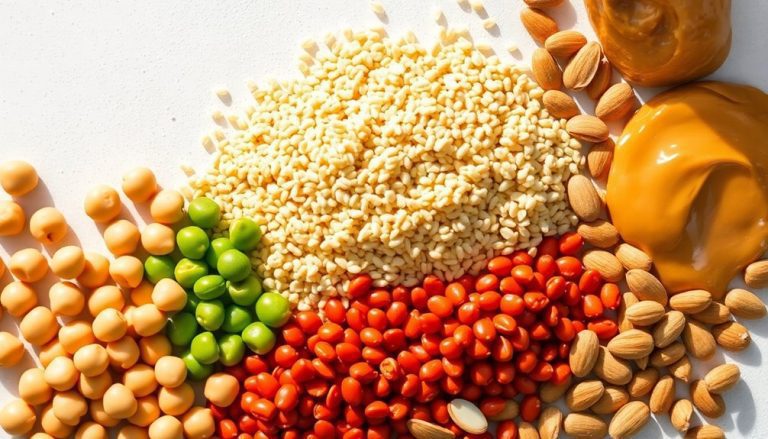For optimal health, focus on three key micronutrients: vitamin D, magnesium, and zinc. Vitamin D is essential for bone health and immune support, and you can get it from sunlight, fatty fish, and fortified dairy. Magnesium helps with over 300 biochemical reactions, improves sleep, and is found in leafy greens, nuts, and whole grains. Lastly, zinc plays a crucial role in immune function and wound healing, with rich sources like oysters, beef, and pumpkin seeds. Understanding how these micronutrients benefit you can boost your health significantly, and there's even more to explore about their roles in your diet.
Key Takeaways
- Vitamin D: Essential for bone health, aids calcium absorption, and supports immune function; sources include sunlight, fatty fish, and fortified dairy.
- Magnesium: Involved in over 300 biochemical reactions, supports bone health, and improves sleep quality; found in leafy greens, nuts, and whole grains.
- Zinc: Crucial for immune function and wound healing; rich sources include oysters, beef, and pumpkin seeds; important for maintaining overall health.
- Regular Monitoring: It's vital to regularly monitor micronutrient levels, especially in regions with limited sunlight or dietary sources.
- Supplementation: Consult healthcare providers for advice on supplementation, particularly for vitamin D and magnesium, to prevent deficiencies.
Vitamin D

Vitamin D plays a crucial role in maintaining your overall health. It's essential for bone health, as it helps your body absorb calcium, which is vital for strong bones and teeth. Without adequate vitamin D, you risk developing bone disorders like osteoporosis or rickets.
You can obtain vitamin D from sunlight, certain foods, and supplements. When your skin absorbs sunlight, it converts that energy into vitamin D, so spending time outdoors can have significant benefits. However, factors like geographic location, season, and sunscreen use can limit your sun exposure. Using proper garden seed storage containers can help you grow your own food, including those rich in vitamin D.
Incorporating foods rich in vitamin D, such as fatty fish, egg yolks, and fortified dairy products, can help boost your levels. If you struggle to get enough from sunlight and diet, consider talking to your healthcare provider about taking a supplement.
Maintaining optimal levels of vitamin D can also support your immune system, helping to fend off infections and reduce inflammation. Additionally, gardening can be a great way to enjoy the benefits of sunlight while providing fresh produce for your diet.
Being aware of your vitamin D status is crucial, especially in regions with limited sunlight. By taking proactive steps, you can ensure you're getting enough of this vital nutrient to support your health and well-being.
Magnesium
While maintaining adequate levels of vitamin D is important, magnesium also plays a significant role in your health. This essential mineral is involved in over 300 biochemical reactions in your body, impacting everything from energy production to muscle function. Additionally, using organic mulching materials like straw can enhance soil health, indirectly supporting plant growth and nutrient absorption, similar to how magnesium supports your health.
Without enough magnesium, you might experience symptoms like fatigue, muscle cramps, or even mood swings. You can find magnesium in various foods, including leafy greens, nuts, seeds, and whole grains. Incorporating these into your diet can help you meet your daily requirements.
Adults typically need around 310-420 mg per day, depending on age and gender. Additionally, magnesium aids in the regulation of calcium levels, contributing to bone health. It also supports your nervous system, helping to reduce stress and improve sleep quality. Furthermore, ensuring your plants receive adequate quality plant food can help them thrive, much like how magnesium supports your health.
If you're experiencing sleep issues or heightened anxiety, it may be worth evaluating your magnesium intake. Keep in mind that certain factors, like excessive alcohol consumption or a high-sugar diet, can deplete magnesium levels.
If you suspect you're not getting enough magnesium, consider consulting with a healthcare provider. They can guide you on whether supplementation is necessary for your optimal health.
Zinc

Zinc's importance in your diet can't be overstated; it's a trace mineral that plays a crucial role in immune function, wound healing, and DNA synthesis. Your body requires zinc for various enzymatic processes, and a deficiency can lead to weakened immunity and delayed recovery from illnesses. Additionally, incorporating compost bin products into your gardening routine can provide nutrient-rich materials that enhance soil quality and plant health, indirectly supporting your dietary needs.
To ensure you're getting enough zinc, you can include various foods in your diet. Here's a quick overview of zinc-rich sources:
| Food Source | Zinc Content (mg) | Other Benefits |
|---|---|---|
| Oysters | 74 | High in protein and omega-3s |
| Beef | 5.3 | Rich in iron and B vitamins |
| Pumpkin Seeds | 2.2 | Good source of magnesium |
| Chickpeas | 1.3 | High in fiber and protein |
| Cashews | 1.6 | Contains healthy fats |
Incorporating these foods into your meals can help you maintain optimal zinc levels. Remember, your daily zinc intake varies by age and gender, so be sure to check the recommended amounts. Prioritizing zinc in your diet can lead to better health outcomes and enhanced overall well-being.
Frequently Asked Questions
What Foods Are Rich in Vitamin D, Magnesium, and Zinc?
You can find vitamin D in fatty fish, egg yolks, and fortified dairy. Magnesium-rich foods include nuts, seeds, and leafy greens. For zinc, enjoy oysters, red meat, and legumes. These foods boost your nutrient intake effectively.
Can I Get Enough Micronutrients From a Vegetarian Diet?
Imagine vibrant veggies painting your plate. Yes, you can absolutely get enough micronutrients from a vegetarian diet. Just focus on diverse foods, like legumes, nuts, and grains, to nourish your body fully and thrive.
How Do I Know if I'm Deficient in These Micronutrients?
You can check for deficiencies by monitoring symptoms like fatigue or weakness, getting regular blood tests, and evaluating your diet. Consulting a healthcare provider can also help you determine if you need supplements or dietary adjustments.
Are There Any Side Effects of Excessive Micronutrient Intake?
Imagine overwatering a plant; it wilts instead of thriving. Excessive micronutrient intake can cause nausea, headaches, or organ damage. Balance is key; listen to your body and consult a healthcare professional if unsure.
How Do Micronutrients Interact With Medications?
Micronutrients can affect how medications work in your body. Some might enhance absorption, while others could interfere, altering effectiveness. Always consult your healthcare provider about your diet to ensure safe medication interactions tailored to your needs.
Conclusion
In your quest for optimal health, embracing these three essential micronutrients can make a world of difference. By ensuring you get enough vitamin D, magnesium, and zinc, you're not just checking boxes; you're nurturing your body's foundation. Think of it as giving your health a gentle nudge in the right direction. So, as you savor the journey of wellness, remember that these nutrients play a vital role in your overall vitality and well-being.




